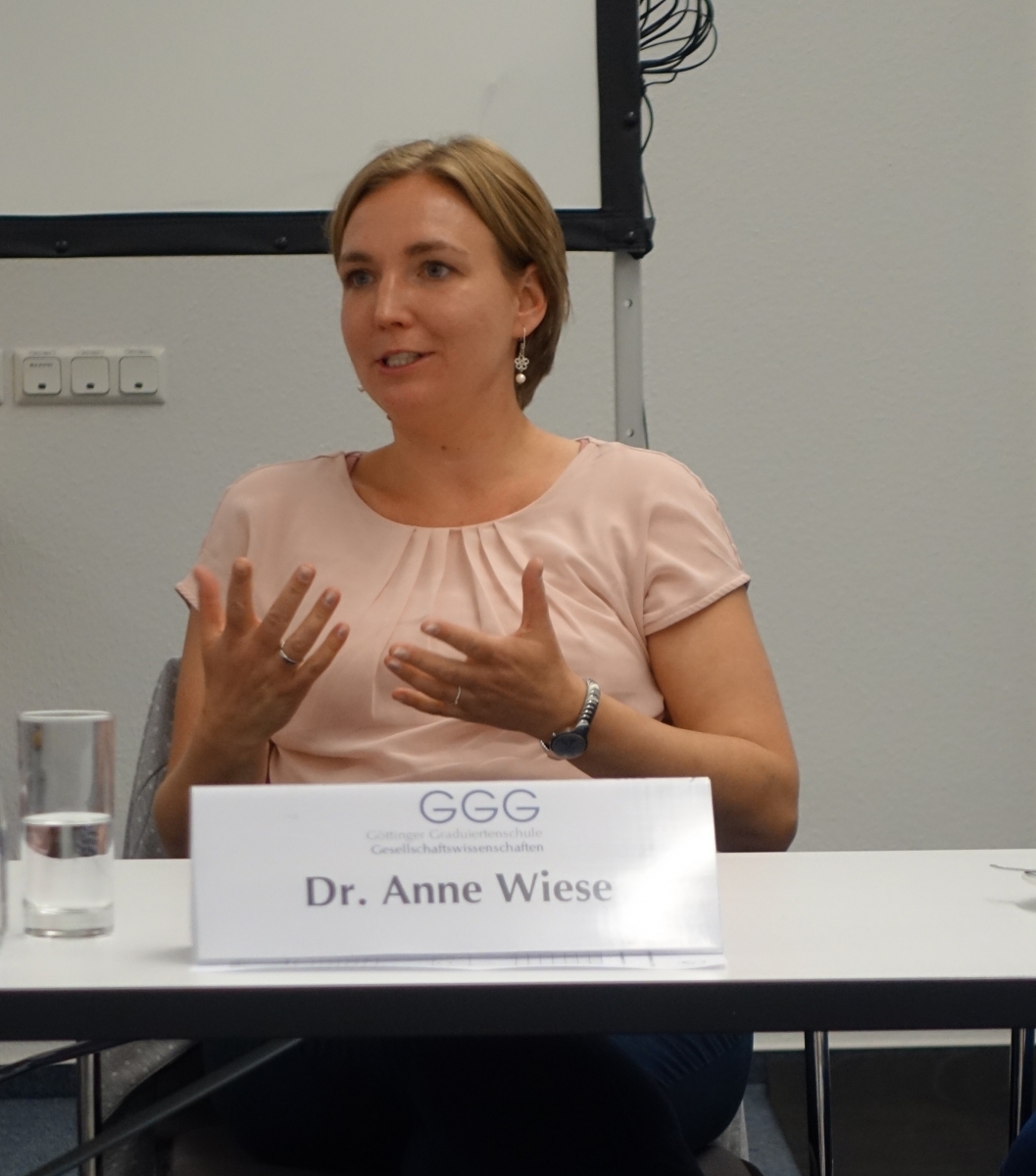It does not always have to be science: GGG alumni report on their experience and career prospects after graduation
Staying in academia is only one option, as a doctorate (in the field of social sciences) opens up far more possibilities: On average, 15% of PhD graduates work in academia, 70% are employed in enterprises and 12% work in the public sector. In order to show you some of these options, alumni talked about their own experience on the way to and in positions outside academia on May 20th 2019:
- Dr. Anne Wiese (PhD at the Faculty of Economic Sciences and today Mangement for Corporate Responsibility at the GLS Group)
- Dr. Torsten Halwas (PhD at the Faculty of Law and today at the Law Department of the Karlsruhe Public Transportation Sercives).
- Dr. Alfred Benedikt Brendel (PhD at the Faculty of Economic Sciences and today Head of Smart Mobility Research Group in Göttingen).
There was vivid discussion on the quite different ways into the public sector, enterprise and practical research. The three alumni explained what was most useful to them for getting started on their professional career, which essentially was a combination of dedication, profound previous experience, some luck, and well-working networks and contacts (see quote: Science and Profession 1).
Dr. Anne Wiese explained that she was happy to have worked on the topic of sustainability in her doctoral thesis, as she is now able to advocate corporate responsibility in her professional practice (see quote: Science and Profession 2). With the focus on smart mobility, Dr. Alfred B. Brendel has also dedicated himself to a topic that he feels strongly about and which is of scientific, economic and social importance.
Contentment with the area of work and the tasks that come with it was of high importance in the reports of the three alumni. All of them work in an area they are interested in and have thus found a place where they can put their skills to good use and realize their ideas (see quotes: Science and Profession 3 and 4).
The alumni also talked about their working conditions. For Dr. Brendel and Dr. Halwas, these were characterized by long working hours in the beginning, which had been (or would have been) very restricting on time spent with the family (see quotes: Compatibility 1 and 2). Dr. Brendel emphasizes the pressure for young academics to publish fast and much. Dr. Halwas worked as lawyer with long working hours for a few years. However, working hours improved considerably due to his employment in the public sector with regulated working hours and the option to take parental leave.
In their jobs, the alumni today still make use of the skills they acquired during their doctoral studies: First and foremost the ability to solve problems, but also scientific understanding, systematic working, flexibility and the ability to work well in a heterogeneous team (see quotes: Competences 1 and 2).
We asked the alumni if they had, in retrospect, any wishes regarding support for the first career steps by GGG or the university. It turned out that offers on first career steps were highly demanded, but they should not require too much time and in addition, they should be designed for specific backgrounds. PhD students who work at professorial chairs would usually have decent networks within the university, but external PhD students would like to have better connections. Also, support for practice contacts and for refining applications for practice were requested (see quotes: Support of the PhD process 1 to 3).
Invitation: Become part of the Alumni-Network
Just as the speakers at the alumni talk 2019 and 2017, former doctoral students of GGG and its member faculties often are still emotionally involved with Göttingen University even after having graduated. After all, they spent many years with intense work, lasting encounters and friendships and (hopefully) lots of joy in the lovely city of Göttingen. Hoping that these alumni would willingly return to their former home for some days, GGG started to invite former doctoral students to share their experience with today’s students. At the same time, the current PhD students would gain private, personal insights into what actually helped the alumni during their own doctorate, what was especially important in hindsight, and what kind of career paths can lead to the various profession fields. If you register with Göttingen Alumni and join GGG’s group there, you can contact GGG alumni for further questions and ideas.
Furthermore, additional members are welcome at the PhD Forum on „Science and Practice“, where PhD students discuss first career steps and occupational challenges.
For further information please contact GGG, Dr. Bettina Ross, Tel. 0551 39 28217 or ggg@uni-goettingen.de.


